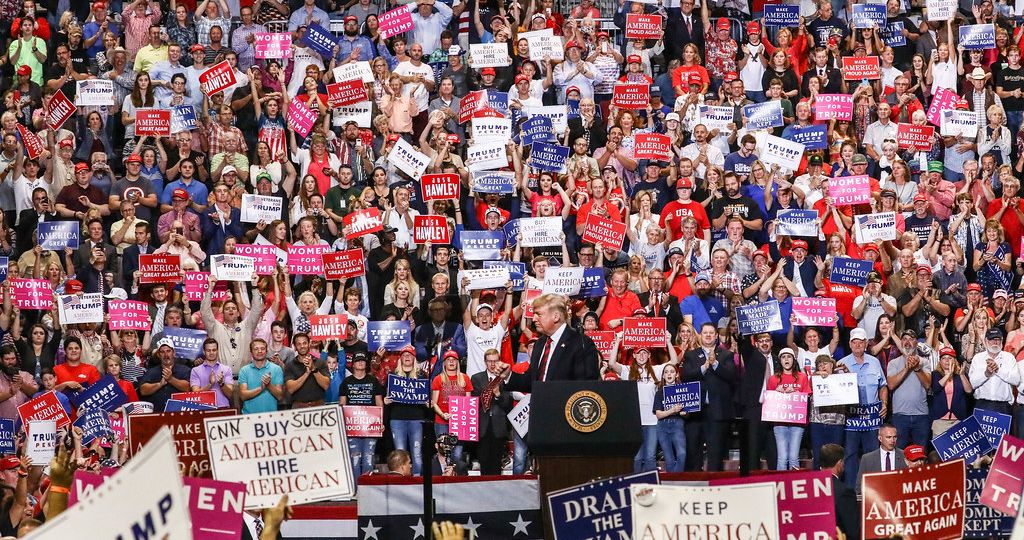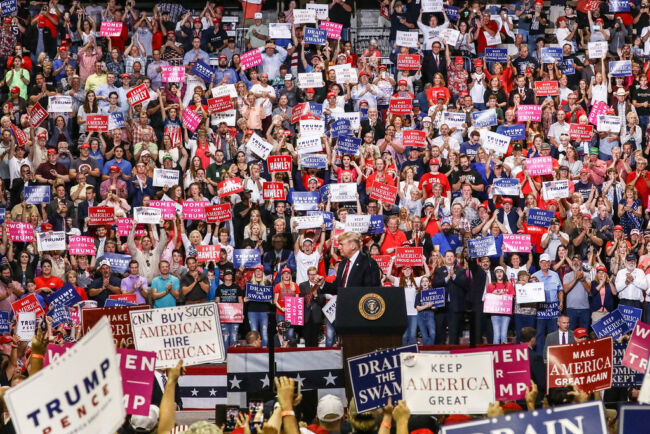
Citizens question if there will be a peaceful transfer of power
As Election Day approaches, President Trump’s statements about a potential refusal of defeat raise questions and public concern.
By Eden Villalovas, Staff Writer
Listen to the article here:

With Nov. 3 less than a week away, the chaotic nature of this election has left the public anxious, and many wonder: What will happen if President Trump refuses to leave the Oval Office? On several occasions, President Trump has suggested that he will not accept the results of the election if he loses.
On Sept. 23 President Trump held a press conference at the White House, where he responded to a question about whether he would agree to a peaceful transition of power if the election does not go his way.
“Well, we’re going to have to see what happens,” President Trump said. “You know that. I’ve been complaining very strongly about the ballots. And the ballots are a disaster.”
Professor Douglas Spencer is a Professor of Law and Public Policy at the University of Connecticut. He is currently working at the University of Colorado’s law program as Distinguished Faculty Fellow at The Byron R. White Center for the Study of American Constitutional Law. Spencer shared his academic insight about the upcoming election and President Trump’s statements.
“In this case, I don’t think we should take his response literally or seriously,” Spencer said. “President Trump often uses the phrase ‘we’ll see’ when he doesn’t want to answer a question and I personally don’t interpret it to mean he is actually planning to occupy the White House after 12 p.m. on January 20 if he loses the election.”
While President Trump’s statements may be faulty, it can negatively impact how American people view the Presidency and the power it holds.
“An ingrained part of our American democracy is to have these peaceful transitions of power,” said Scott Skinner-Thompson, an associate professor of law at Colorado Law School who studies constitutional law, civil rights and privacy law with a focus on LGBTQ+ issues.”
From coronavirus to the crises with the Postal Service, this election cycle has contributed to the fear of some people about the possibility of a post-election disaster. The Supreme Court confirmed the decision of allowing Pennsylvania to count mailed-in ballots, collected up to three days after Nov. 3, opposing the Republican preference of denying this extension. Specifically, on Oct. 26, the Supreme Court refused to extend Wisconsin’s deadline for receiving absentee ballots six days after the election.
“The results of November’s election will have a profound impact on the American health care system, the future of policing, the federal judiciary and the future of NATO and other international alliances,” Spencer said.
President Trump has repeatedly stated that he believes mail-in ballots will be used to scam the election, including the first presidential debate of 2020. During a campaign rally on Sept. 25, at Williamsburg International Airport in Newport News, Virginia, President Trump addressed his issues with the possible outcome of the election: “We’re not going to lose this, except if they cheat. That’s the way I look at it.”
All presidents in American history have respected the law under the constitution, declaring how the transfer of power from one president to the next is handled. Under the American Constitution, the Twentieth Amendment reads:
“The terms of the President and the Vice President shall end at noon on the 20th day of January, and the terms of Senators and Representatives at noon on the 3d day of January, of the years in which such terms would have ended if this article had not been ratified; and the terms of their successors shall then begin.”
Although the terms are clear, Spencer points out that the Constitution does not address the scenario in which a president refuses to let go of his position of power.
“The 22nd amendment established term limits for presidents in 1947 and no president has refused to leave office since,” Spencer said. “There are no other constitutional provisions that address the possibility of a president rejecting the outcome of an election or refusing to leave office.”
Skinner-Thompson pointed out that under the 20th amendment, the courts are bound by constitutional law to inaugurate a president, even if the results of the elections are disputed by a party.
“For one, the Supreme Court will hold an inauguration and they will inaugurate the next president on Jan. 20,” Skinner-Thompson said. “The inauguration date can not be delayed and the inauguration date is set in the Constitution.”
The American people have seen this type of rhetoric from President Trump in the past, specifically during the 2016 election. In 2016, Hillary Clinton won the popular vote by well over 2 million votes, while President Trump won 304 electoral college votes to Clinton’s 227. However, Trump tweeted on Nov. 27, 2016, rejecting these results:
“In addition to winning the Electoral College in a landslide, I won the popular vote if you deduct the millions of people who voted illegally.”
Like all elections, the stakes are high, and the nation has felt the weight of the social unrest leading up to this election. As the election nears an uneasy end, Spencer encourages everyone to have faith in our long-standing political institutions.
“President Trump has pushed the boundaries of executive power and challenged all sorts of constitutional norms (indeed, these are the very reasons that many people support him!),” Spencer wrote in an email to The Bold.
“I think November’s elections will mirror what we have seen in various contexts over the past three and a half years: our political institutions may bend, but they won’t break.”

